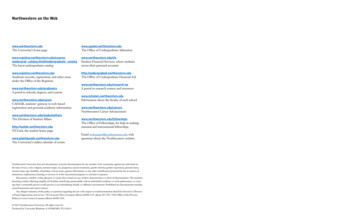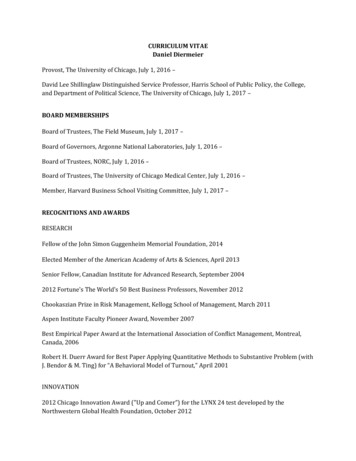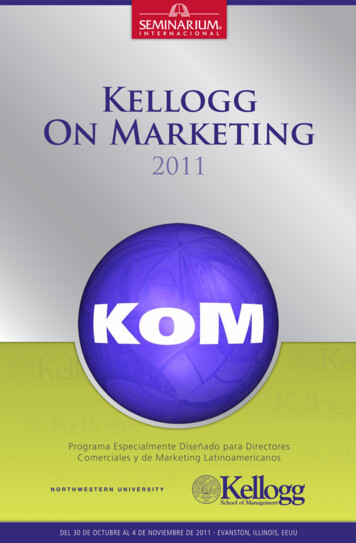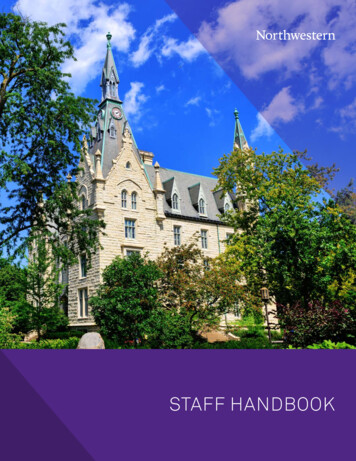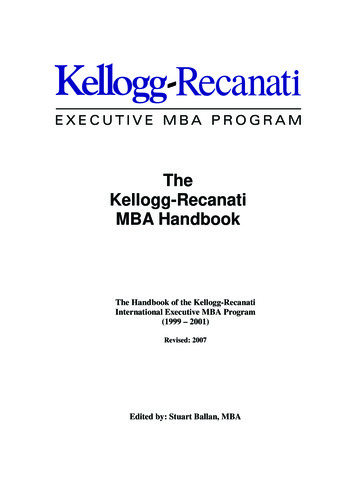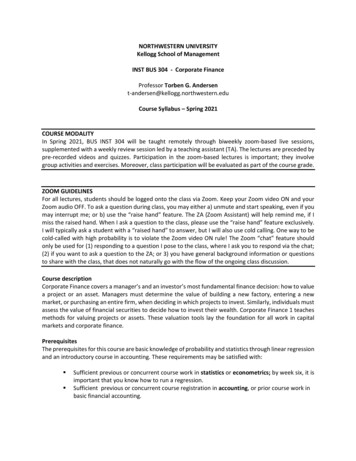
Transcription
NORTHWESTERN UNIVERSITYKellogg School of ManagementINST BUS 304 - Corporate FinanceProfessor Torben G. Andersent-andersen@kellogg.northwestern.eduCourse Syllabus – Spring 2021COURSE MODALITYIn Spring 2021, BUS INST 304 will be taught remotely through biweekly zoom-based live sessions,supplemented with a weekly review session led by a teaching assistant (TA). The lectures are preceded bypre-recorded videos and quizzes. Participation in the zoom-based lectures is important; they involvegroup activities and exercises. Moreover, class participation will be evaluated as part of the course grade.ZOOM GUIDELINESFor all lectures, students should be logged onto the class via Zoom. Keep your Zoom video ON and yourZoom audio OFF. To ask a question during class, you may either a) unmute and start speaking, even if youmay interrupt me; or b) use the “raise hand” feature. The ZA (Zoom Assistant) will help remind me, if Imiss the raised hand. When I ask a question to the class, please use the “raise hand” feature exclusively.I will typically ask a student with a “raised hand” to answer, but I will also use cold calling. One way to becold-called with high probability is to violate the Zoom video ON rule! The Zoom “chat” feature shouldonly be used for (1) responding to a question I pose to the class, where I ask you to respond via the chat;(2) if you want to ask a question to the ZA; or 3) you have general background information or questionsto share with the class, that does not naturally go with the flow of the ongoing class discussion.Course descriptionCorporate Finance covers a manager’s and an investor’s most fundamental finance decision: how to valuea project or an asset. Managers must determine the value of building a new factory, entering a newmarket, or purchasing an entire firm, when deciding in which projects to invest. Similarly, individuals mustassess the value of financial securities to decide how to invest their wealth. Corporate Finance 1 teachesmethods for valuing projects or assets. These valuation tools lay the foundation for all work in capitalmarkets and corporate finance.PrerequisitesThe prerequisites for this course are basic knowledge of probability and statistics through linear regressionand an introductory course in accounting. These requirements may be satisfied with:§§Sufficient previous or concurrent course work in statistics or econometrics; by week six, it isimportant that you know how to run a regression.Sufficient previous or concurrent course registration in accounting, or prior course work inbasic financial accounting.
Course readings1. Corporate Finance, Jonathan Berk and Peter DeMarzo, 5th Edition, PearsonThis book is very good and strongly recommended. See textbook acquisition instructions posted onthe Canvas website for details on how to acquire access to MyFinanceLab, an e-book, and a loose-leafversion of the text at significantly reduced prices.2. Lecture slides, topic videos, cases, and readings as assigned. Lecture slides, video links, and readingswill be posted on the course website. Cases will be distributed via a link to Study.Net link on Canvas.All course materials are the intellectual property of the instructor. You may not distribute class materialselectronically or in any form to anyone – inside or outside of Northwestern. In particular, you may notshare course materials with other students or with your employers after graduating.GradingYour grade in the course will be based on the maximum of the following: 15% video quizzes, 20% group case studies, 20% midterm, 40% final, 5% class participation.15% video quizzes, 20% group case studies, 0% midterm, 60% final, 5% class participation.As indicated, there are several components to your course grade.1. Video quizzes: Some course content is delivered asynchronously via videos. Following each video,there is a Canvas quiz. All quizzes for a given topic must be completed on Canvas on or before 1:PM Evanston time on the day they are due. Late quizzes will not be accepted! When you submityour quiz answers, Canvas will immediately tell you if your answers are correct. You may also takethe quizzes as many times as you like. If you take the quiz multiple times, your highest scoresubmitted before the due date/time will count towards your course grade. Solutions to the videoquizzes will be posted to the website. Note, there are multiple quizzes for each topic.2. Group Case Studies: There are several graded case studies. For these case studies, students willbe assigned into a study group of four or five people. Case study groups will be posted on thecourse website by the end of the second week of class. Students may not attach their name to acase submission, if they did not participate in its completion. Class time will be devoted to thediscussion of the cases, but no “solutions” will be provided. For each case, one member of eachgroup must upload files to Canvas before 10:00 AM Evanston time on the day they are due. Latesubmissions will not be accepted! All students in a study group will receive identical scores ongroup case submissions. Responsibility for submitting the desired answers by the deadline is thejoint responsibility of the entire group, regardless of the allocation of the work load.3. Midterm Exam: There will be a virtual midterm exam administered remotely through Canvas. Themidterm is open book and open note. You will need your laptop, but the laptop use is restrictedto accessing the course webpage, course files you have saved to your computer, or to conductcalculations in Excel. Completing the midterm exam is optional, and as a result, there will be norescheduling. Submissions after the 100 minute time limit has expired will not be accepted!4. Final Exam: The final exam will be administered remotely through Canvas. It must be completedduring the final exam period. It will be available throughout the exam period, but students mustsubmit the completed exam within 180 minutes of when they access it. The final exam iscumulative, open book, and open note. You will need your laptop, but laptop use is restricted toaccessing the course webpage, course files saved to your computer, or to conduct calculations inExcel. Final exam submissions after the 180 minutes limit has expired will not be accepted!
5. Participation assessment: I will evaluate your participation according to the following guidelines.You may provide additional input through peer review, if you so choose, as described below.ParticipationGradeAB BB-CCharacteristicsIn synchronous meetings:Regularly volunteered comments or asked questions that other students foundvaluable.In response to being called upon, always demonstrated preparedness.On the discussion boards:Regularly asked questions that other students found valuable.Regularly offered help/suggestions to classmates.In synchronous meetings:Often volunteered comments or asked questions that other students foundvaluable.In response to being called upon, often demonstrated preparedness.On the discussion boards:Often asked questions that other students found valuable.Often offered help/suggestions to classmates.In synchronous meetings:Occasionally volunteered comments or asked questions that other students foundvaluable.In response to being called upon, occasionally demonstrated preparedness.On the discussion boards:Occasionally asked questions that other students found valuable.Occasionally offered help/suggestions to classmates.In synchronous meetings:Infrequently volunteered comments or asked questions that other students foundvaluable.In response to being called upon, infrequently demonstrated preparedness.On the discussion boards:Infrequently asked questions that other students found valuable.Infrequently offered help/suggestions to classmates.In synchronous meetings:Never volunteered comments or asked questions that other students foundvaluable.In response to being called upon, never demonstrated preparedness.On the discussion boards:Never asked questions that other students found valuable.Never offered help/suggestions to classmates.Peer review After the course completion, but before the end of week 10, group members can take theopportunity to evaluate each other. In particular, you may (confidentially) recommend a reduction (up to25%) in the group score for specific group members, that you feel did not do their part of the work. Thiscan be used for final assignment of the group case study grade for individual students.
Re-grade PolicyIf you feel that your quizzes, cases, or exams have been incorrectly graded, you can submit a re-graderequest. All requests must be made in writing (via email) within seven working days after the assignmentor exam has been graded, returned and received by you. Your request should consist of a short, explicitexplanation of why you think the grading is incorrect. Upon submission of a re-grade request, I willreview your entire assignment/exam and will let you know my decision as quickly as possible. Noticethat your grade might increase OR decreaseHonor codeThe first sentence of the Kellogg Honor code reads: “All students enrolled in a course offered by theKellogg School of Management agree to abide by the Kellogg Honor Code.” Please read the honor codeto make sure that you know what this entails. You can find it onor-code.aspx. If you are in doubt about whethersomething is acceptable under the honor code, please do not hesitate to ask me.In particular, the following are considered honor code violations:1. Consulting materials distributed in any other section of this course or any other Kellogg orNorthwestern course.2. Discussing cases with any individuals – including former students – other than those studentsin your current case group.3. Sharing course materials with anyone at anytime.4. In future quarters, discussing any course assignment with students then enrolled in thiscourse before those students’ due date.5. Seeking or receiving any assistance with the quizzes, the midterm, or the final exam.Honor code violations will be reported to the proper university authorities.Course Attendance and ParticipationThe course will be virtual. These are my requirements for class attendance and participation, not doingthese will result in losing participation points and, more importantly, a less interesting and lively class: Attend all classes Come to class prepared (I may cold call you!) Make sure to log intp zoom a few minutes earlier than the class start time. Please also make sure you use your full name in your zoom profile. Zoom Assistant: The ZA will be helping me manage many of the logistics of Zoom, including polls,managing the participant list, and troubleshooting. If you have any technical issues, or anything thatneeds to come to my attention during class, private chat with the ZA. You must enable your video: both I as well as your fellow students want to see you on our side ofZoom. Please feel free to use your natural background or a virtual one. However, please avoidbackgrounds that may be offensive or those that would distract others. During class, you should devote your full attention to the class material and discussion – please donot use any other electronic devices, except the one you are using to connect to the class. Also, pleaseavoid leaving your seat, doing chores or taking a break during class.
All students should join the class with their audio muted. I will let you know when you can unmuteyour audio and join the class discussion. If you have a question or would like to participate in classdiscussion please raise your digital hand using the “Raise Hand” icon. Waiting room: Feel free to join the Zoom class 10-15 minutes before the start. You will be placed inthe waiting room (you can’t see or hear anyone, nor they you) until 5 minutes before class starts. Lectures and class discussions are for registered students only – access to our Zoom meetings willbe secured – you may not share links or passwords with anyone, including friends and family. Similarly,you may not distribute or post online any course material, including handouts, videos or screen shots. Chat: During class, you will not be able to send global chat messages or communicate with otherstudents. If you need to send me a message during class, do it through the ZA. Participating in class: If you have a question or would like to participate in class discussion, pleaseraise your digital hand using the “Raise Hand” icon in the participant window. Both the ZA and I willmonitor hand raises to see when questions arise or to call on a student to answer a question. I prefercontent questions to come this way rather than as a private message to the ZA. I will also pauseregularly to ask for questions. Please put your hand down, if your question has been answered, or ifsomeone makes the same comment that you intended to make. I may also use the yes/no response inthe participant window. Warm and cold call: Students are expected to come to class prepared. I will use a combination ofwarm and cold-calling for answers to some questions, and ask for volunteers for others. Layout: You have control over what you see in your Zoom window. I recommend the “Side-by-side”view -- you see the slides large and active speaker small. But this is a matter of personal preference.Please do not hesitate to participate or ask questions! Everyone will learn more and enjoy class more ifthe class is active.Group CasesThe case assignments are group assignments. You will be assigned to a group within a couple ofweeks and you must work in your assigned group. Each group has to upload a solution via Canvas,clearly list the name of all group members at the top of the first page or tab. In the interest offairness, and as required by the honor code, all students face the same deadlines. Your case writeup should be of any length you feel is appropriate to answer the questions, but for most cases anExcel file answer is sufficient.I abide by the general rule that no questions are answered about a case before it is turned in. If youare unclear about something, make an assumption, and state this assumption very clearly in youranswer, and move forward with your solution. As long as your assumption is reasonable, then yourapproach will be acceptable.After the last case has been submitted, each of you will be able to fill out a survey in which yougrade the other group members on their contribution. The answers to this question can have asignificant effect on the grade each member receives on all of the cases.
Class session recordingsThe Zoom-only sessions will be recorded, when the discussion involves the entire class. Group exercisesand discussions conducted via breakout groups will not be recorded.Laptop/Tablet and Phone PolicyI will do my best to avoid being boring, but that depends in part on your class participation. To encourageparticipation, I request that you do not use your phone while in class. We will use laptops at various timesin class. Apart from these moments, I require that your other laptops and tablets be closed.Additional resourcesDiscussion boardsOutside of class, post your questions in the appropriate thread on the discussion board. As theparticipation guidelines above suggest, students are encouraged to post replies. If necessary, I will replyno later than the next business day. Please plan accordingly! Course-related questions sent to medirectly will be posted on the discussion board with attribution.In-person “office” hoursI am available to meet with students via zoom by appointment. To schedule a zoom meeting with me,send a request directly to me at t-andersen@kellogg.northwestern.edu. As a first cours of action, youcan also ask questions about the course material in the weekly TA sessions.MyFinanceLabAdditional (ungraded) practice problems are also available on MyFinanceLab, to which you gained accesswhen you acquired the textbook following the instructions posted on Canvas.1. Go to Study Plan and navigate to the section of the textbook from which you wish theproblems to come.2. You may click on Choose a Hint to get help on the question. Do not worry aboutpoint deductions, as these questions will not be graded for this course.3. For additional questions, you can click on Assignments then Take a Quiz/Test on the left-handside menu. Although they are called quizzes, they will not be graded and are provided for yourpractice only.4. Please note that many of the problems on this website are beyond the scope of our course.You may wish to restrict your use of MyFinanceLab to the textbook chapters and sectionslisted on the course outline.
Projected Course Schedule and TopicsCourse introduction What is Finance and this course about? (1 session)Module 1 Time Value of Money (2 sessions)Module 2 Applications of Time Value of Money, including Stock and Bond Pricing (2 sessions)Module 3 Capital Budgeting with Applications (3 sessions)Module 4 Pro Forma Valuation with Applications (3 sessions)Module 5 Multiples Valuation with Applications (2 sessions)Module 6 Risk and Return, Portfolio Choice and the Capital Asset Pricing Model (CAPM) (3 sessions)Module 7 Capital Budgeting with Risk (2 sessions)
NORTHWESTERN UNIVERSITY Kellogg School of Management INST BUS 304 - Corporate Finance Professor Torben G. Andersen t-andersen@kellogg.northwestern.edu Course Syllabus - Spring 2021 COURSE MODALITY In Spring 2021, BUS INST 304 will be taught remotely through biweekly zoom-based live sessions,


